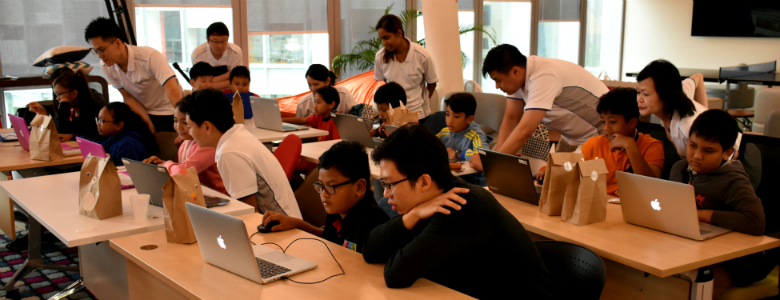Why kids should consider Coding

“Everyone should learn how to program a computer, because it teaches you how to think.”
These (slightly paraphrased) words still resonate 21 years after the late Steve Jobs, co-founder of Apple, said them in a now-famous TV interview.
So now you can understand why GovTech’s Government Digital Services team recently organised an Hour of Code activity for 18 children supported by Mendaki.
(And a big thank you to the team from the Municipal Services Office for helping out!)
The goal was to inspire them to give coding a try, using learning materials from Code.org.
Of course, it helped that there was a Star Wars gamification element that made it fun, during the session held at the HIVE located at the Sandcrawler Building.
You can learn more about the event by checking out this GDS blog.
It’s a very different world today from the childhoods of most GovTechies.
Many children today take to computers, smartphones and tablets like digital natives, and there’s a proliferation of coding classes and courses.
But putting aside the (possible) benefits of better grades, could kids truly benefit from picking up coding?
In the spirit of adopting future-proof skills, here are four reasons why experts say learning how to code could be good for children.
1. Code is a universal language.
The code that ran the computer systems aboard Apollo 11, the very first human spaceflight that famously landed Neil Armstrong on the Moon, was far less complicated than the code behind Microsoft Word — or Pokémon Go.
For the workforce of tomorrow, the ability to code or think like a programmer is going to be as useful as mastering a second or third language, according to Mr Jasper Loong, Managing Director of Nullspace, a school that offers programming and robotics classes for children.
To keep up with the insatiable demand for new apps and devices, everyone from entrepreneurs, graphic designers and marketers to bankers will be expected to understand or write code in some form or another in the coming decade, he believes.
“It certainly would not come as a surprise to me if programming knowledge becomes a core prerequisite for most jobs in the near future. It would be the norm, rather than the exception,” said Mr Loong.
“Equipping children with these skills at a young age would hence ensure that they are ready for the new norm and put them in excellent stead in the increasingly competitive job market,” he advised.
2. Picking up problem-solving early
“Programmers build skills in problem solving, systems design, and logical thinking. New programming languages and approaches emerge often, so things don’t ever get old,” said Mr KT Khoo, Business Development Manager of Tinkercademy, which provides coding and programming classes for students.
With robotics, in particular, kids will learn how to combine coding and design—kind of like a combined left brain and right brain exercise.
“Robotics is a discipline that encompasses both programming and mechanical design skills,” Mr Loong said.
There is also the fact that children will learn teamwork and collaboration.
“Contrary to some accounts, programming is not a solitary activity as you get to work in teams, and connect with tech communities around the world,” Mr Khoo added.
3. Never too young or too old to start
The good news is, with age-appropriate technology toys available, coding and programming can be learned from a very young age. “At any age from four and up, really,” said Mr Khoo.
“Bee-Bot, KIBO, littleBits and Circuit Stickers are programmable tech toys in IMDA’s PlayMaker programme for preschools. We’re helping to run this programme in 160 preschools for 2016, by introducing the toys to teachers and letting them infuse the material into their curricula,” he continued.
In addition, coding allows kids to advance according to their own pace. “Coding offers a fantastic chance for kids to construct their own learning. It mostly comes without fixed syllabuses and standardised tests, and offers kids plenty of chances for learning by experimentation and learning from mistakes.”
For kids ages seven and up, apps such as Scratch and Tickle provide great block-based introductions to programming, said Mr Khoo, while programmable robots Sphero and Dash & Dot also give them the chance to learn to perform various tasks and solve problems.
As for kids 13 years and above, Mr Khoo recommends getting their hands dirty with actual code.
4. Invent the future
This is a no-brainer. With the proliferation of apps, digital services and platforms that serve to make our everyday lives better, programming and computing skills are essential to Singapore’s vision of becoming a smart nation.
Furthermore, take a look at the disruptive technologies that surround us today, such as Big Data, the Internet of Things, artificial intelligence and self-driving vehicles. All these require the contributions of skilled, intrepid programmers.
The talent vacuum for programming is also evident from the immediate demand for tech and IT professionals today. According to data released by IDA last year, there are almost 15,000 tech and IT job vacancies waiting to be filled, and this demand is expected to double by 2017.
Indeed, the next Mark Zuckerberg could be out there somewhere, including among the children who enjoyed their time coding at the HIVE.
“There’s a chance this might be their thing—what they might be good at, become passionate about, and want to dedicate their lives to do. It’s not for everyone, but it’s easy enough to find out,” Mr Khoo pointed out.
“Increasingly, most aspects of work, life and fun are tied inseparably to programming. If it is their thing, then they will have a chance to literally invent the future.”
Image credit
- All photos courtesy of Mr Hardi Ismail (MSO) And that, ladies and gentlemen, is why GovTech believes in inspiring children to explore coding.

